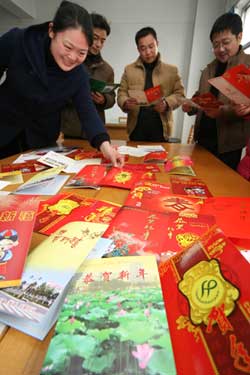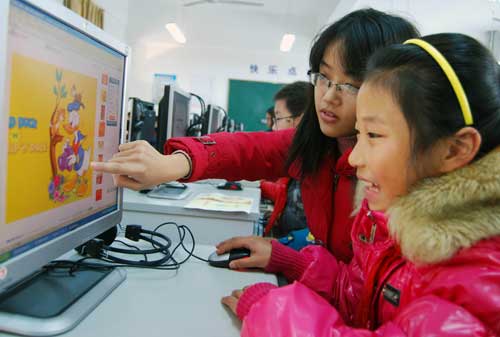Medium of the message
Updated: 2012-01-28 07:22
By Wang Qingyun (China Daily)
|
||||||||
"When I was young, I would write wishes on paper cards and exchange greetings with friends. But that was when pagers were a fad."
However, there are still those who prefer the traditional greeting cards.
Zhang Leyi is a 64-year-old retired piano teacher in Shanghai, and she still receives greeting cards from her students.
"These cards are the most beautiful notes in the world," Zhang said.
"I boxed them up and brought them with me to my new apartment."
|
 Residents buy New Year greeting cards at a post office in Xuchang, Henan province, in December 2007. Niu Shupei / For China Daily |
She has received fewer greeting cards from her students in recent years, but though receiving calls and e-mails make her just as happy, she said there were some things she missed.
"I can now use the Internet to send e-cards to my students, family and friends, which is very convenient. But I miss the pleasure of getting a card in the mailbox downstairs, and the fun we had when shopping for greeting cards in stores," Zhang said.
But of course, it is the greeting card companies themselves that miss the good old days the most.
The manager, surnamed Zhang, of the domestic marketing department at Guangdong Shenglu-Pacific Stationery, a Guangzhou-based greeting card company founded in 1997, said the popularity of online and SMS greetings had been a big blow to the company's business in the domestic market.
"The company's annual card sales in the domestic market are now only 30 percent of what they were before the year 2000," said Zhang, adding that at present about 80 percent of the company's domestic market goes to companies and other organizations, who order batches of specialized greeting cards.
"But our international sales have remained stable," he said.
Jim Jordan, managing director of Pacific Greetings, the exclusive distributor for Hallmark Cards in Hong Kong and Singapore and the exclusive Hallmark greeting card licensee for China, admitted the Internet and mobile phones had had "a bit of an impact" on the card business in China.
According to Jordan, the largest markets for greeting cards are those where people speak English, and Hong Kong and Singapore, where English is an official language.
But the market in China is buoyed by specialized orders from companies and other organizations, said Jordan.
"I'm not saying that the consumer market in China is not important, but our strategy right now is to focus more on corporate business."
Wu Weibiao, general manager of Pacific Greetings (China), believes cultural difference play a big part in why Chinese people use greeting cards less.
"They have a 'greeting card culture' in English-speaking countries, and people there are used to expressing their feelings through greeting cards. There are a variety of greeting cards for different occasions, such as birthdays, thank you, promotions, moving to a new home and weddings. But in China for celebrations such as weddings, people prefer red envelopes rather than cards."
According to Wu, the Mid-Autumn Festival, Teacher's Day and Spring Festival are the peak periods for sales in the Chinese mainland.
Wu said the company has established online greeting card stores to meet the changing trends.
"However, I feel the business in China is getting warmer in recent years. More people are going back to the cards, something they can touch, feel and cherish," said Wu.
Zhou Wenting contributed to this story.
|
A student from Jiangsu University of Science and Technology assists a pupil to make an e-card at Zhufang Road Primary School in Zhenjiang, Jiangsu province, in December 2011. Shi Yucheng / For China Daily |

 Relief reaches isolated village
Relief reaches isolated village
 Rainfall poses new threats to quake-hit region
Rainfall poses new threats to quake-hit region
 Funerals begin for Boston bombing victims
Funerals begin for Boston bombing victims
 Quake takeaway from China's Air Force
Quake takeaway from China's Air Force
 Obama celebrates young inventors at science fair
Obama celebrates young inventors at science fair
 Earth Day marked around the world
Earth Day marked around the world
 Volunteer team helping students find sense of normalcy
Volunteer team helping students find sense of normalcy
 Ethnic groups quick to join rescue efforts
Ethnic groups quick to join rescue efforts
Most Viewed
Editor's Picks

|

|

|

|

|

|
Today's Top News
Health new priority for quake zone
Xi meets US top military officer
Japan's boats driven out of Diaoyu
China mulls online shopping legislation
Bird flu death toll rises to 22
Putin appoints new ambassador to China
Japanese ships blocked from Diaoyu Islands
Inspired by Guan, more Chinese pick up golf
US Weekly

|

|







